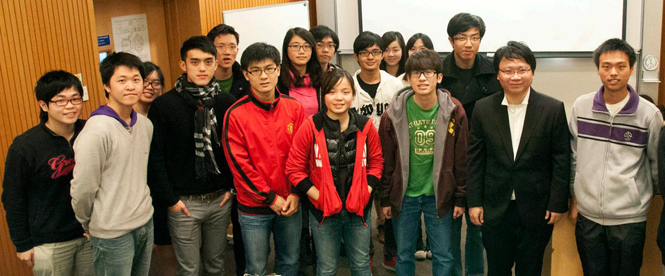通識教育模範教學獎2021
時間: 3:45 p.m. - 5:30 p.m.
地點: 香港中文大學康本國際學術園7號演講廳
本年度榮獲提名的老師有七位。教務會通識教育委員會議決頒發「通識教育模範教學獎」予人類學系的鄭詩靈教授、生命科學學院的朱建勤先生,以及哲學系的高基存博士。
鄭詩靈教授
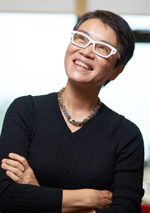
Sealing Cheng is Associate Professor in the Department of Anthropology, CUHK. She received her DPhil in Anthropology from the University of Oxford and completed a postdoctoral fellowship in Gender, Sexuality, Health, and Human Rights at Columbia University. She was Associate Professor in Women’s and Gender Studies at Wellesley College before joining CUHK in 2012. Her research is located at the intersection of gender, sexuality, and mobility. She has conducted research and photovoice project with Korean sex workers in a red-light district, co-founded an Afro-fusion band, Talents Displaced, made up of asylum-seekers, refugees, and ethnic minorities in Hong Kong. Her first book, On the Move for Love: Migrant Entertainers and the U.S. Military in South Korea (University of Pennsylvania Press 2010) received the Distinguished Book Award of the Sexualities Section of the American Sociological Association in 2012.
Three keywords summarize my beliefs about teaching and learning: Passion, Participation, Partnership.
Passion. I seek to cultivate a passion for learning in students. Providing students with the intellectual tools to understand, reflect, and analyze complex issues is essential, but inadequate. It is the deeply felt feeling of excitement for knowledge, the capacity to reflect, and the readiness to act that I hope to inspire in students. By stimulating this affective dimension of learning, my goal is to encourage, challenge, and facilitate students in a possibly life-changing learning experience.
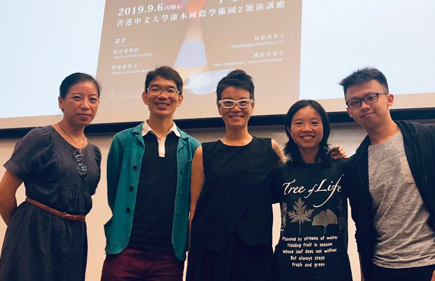
Participation. Anthropology is about understanding the different meanings of being human across time and space. Anthropologists produce knowledge by conducting fieldwork and immersing themselves in the lives of Others. In the process, we learn to grapple with the surprises, uncertainties, and conflicts that arise from differences in beliefs, values, and needs, and we come to be more reflective about who we are, and what we could become in this shared world.
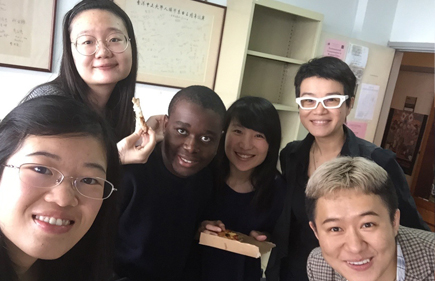
Partnership. My teaching engages students as partners in knowledge producers, with me and with each other. Students are motivated when they acquire skills to critically analyze matters global and local, big and small, public and personal. In all my courses, I use current examples of world affairs or popular culture to draw students into discussion and engagement with the academic literature. This is, however, not just about being ‘interesting’ to students, but to let them be co-producers of academic knowledge that is alive and relevant to their everyday life. Learning is about collective sharing and building.
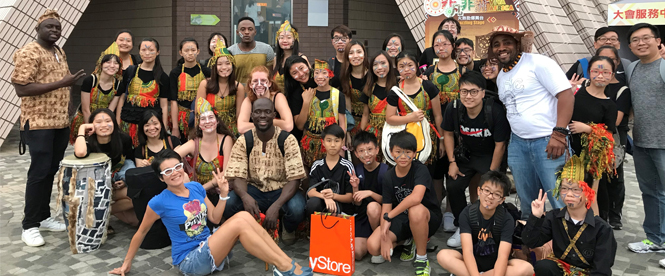
I believe General Education is about preparing our students with the expansive intellectual grounding to participate effectively and ethically in this world. We live in an increasingly divided world marked by a range of deepening crises, while simultaneously we congratulate ourselves for new technological advancements or humanitarian projects. What are we supposed to think about these paradoxes, and more importantly, what could we do? Instead of a focus on solving problems, the broad-based inquiry in General Education develops in students an awareness of history and context, a fluency with diverse perspectives, as well as a capacity to consider which problems need solving. As such, General Education provides students with the critical skills to be self-reflective, question assumptions, engage with differences, and envision new possibilities.
One clear objective of CUHK’s General Education is the ‘well-rounded intellectual development of students’ as ‘lifelong learners and engaged citizens with a global awareness.’ I understand this objective as creating an enabling environment for students to realize that we are all products of history, and yet we have the power to act as ethical beings, and that we are all connected in this shared world.
朱建勤先生
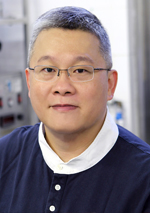
Mr. Chu Kin Kan Astley received his BSc and MPhil degree in Food and Nutritional Sciences (FNS) from The Chinese University of Hong Kong. He began his work in FNS programme as a project coordinator responsible for various research and education activities. Besides research works and consultation service, Astley also contributed a lot to the laboratory teaching and course development for the FNS programme. In 2012, Astley joined the School of Life Sciences (SLS) as an Assistant Lecturer. Then, he developed a new GE course, UGEB2364 Food Safety and Processing Technology, and has been teaching the course since 2015. As a certificated food scientist (CFS, IFT), Astley is passionate about food science education, especially in the field of food safety, processing technology and product development. He also has a great interest in teaching material development and has designed many workshops and experiments for the learning of food science.
Being a graduate of CUHK, I deeply realize the importance of the general education to a student in a University. I joined and started teaching a UGEB course by coincidence. My experience always reminds me that a GE course can be highly influential, especially when it involves the daily issues happening around us. Being a food scientist, I would like to share scientific knowledge and up-to-date information of food safety and processing with the student through my GE course. With enhancement of background knowledge, I hope students will find it easier to understand the public concerns about food and develop a logical mindset to analyze the related information with scientific discipline. In this way, they can take better care of themselves and their families on food consumption and personal health.
GE courses are basically designed for non-major students. With appropriate selection and adjustment of teaching contents, I believe that the layman background of the students is never a problem for the teacher. However, students’ lack of confidence in learning could pose a great challenge to the teacher. Additional incentives are indispensable to facilitate the teaching process and encourage student learning. Similar to many science teachers, I would like to use everyday objects and scenarios to introduce various science principles and food safety concepts. Undoubtedly, it is an effective way to deliver new knowledge to students. Connecting science to everyday life not only inspires the students but also intensifies their interests and self-motivation in learning through studying the issues they are concerned about. To make learning fun is another effective approach to increase student engagement. The idea of fun learning can be somewhat hard to grasp, but yet we know that learning could be fun, or at least, it should be.
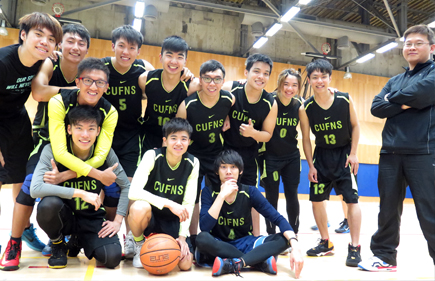
In these years, the COVID pandemic brings a lot of changes and challenges to the world. Education work is also affected and corresponding alterations are inevitable. To think positively, this provides a golden opportunity for online education development. The pandemic has posed a great challenge not only to the teaching process, but also to the student learning activity. For instance, the effectiveness of some conventional learning activities like group project may be weakened as students would encounter difficulties in communicating and working together. Nevertheless, other new learning activities can be developed in different e-learning platforms, such as CUHK-Blackboard, which provides a convenient medium to conduct interactive learning activities via the internet. Encouraging student learning through the redesigned assessment activities was the main adaptation I tried in this period.
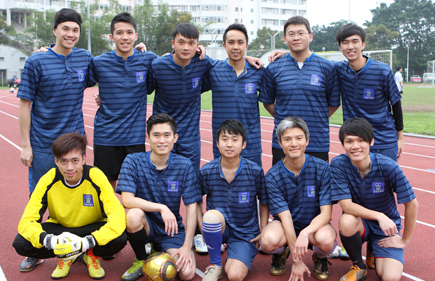
Like other courses, a diversified assessment scheme is used in my course to evaluate different learning outcomes. Enrichment of subject knowledge is the basic element to evaluate students’ learning achievement. Anyway, as people can obtain factual information easily in the internet era, the traditional type of examination emphasizing memory or recall of facts may not be the best way to evaluate the knowledge of students in this generation. In the transition to online teaching, the traditional examination has been replaced by a number of short after-class online quizzes on the Blackboard. Some merits of this change could be observed from the positive feedback received from the students:
Students are not required to memorize tons of subject knowledge at once. It relieves them of the pressures on learning, especially in the trying moment of pandemic and changes. It also increases the learning confidence of some students without any science backgrounds.
The questions can help to recall the main points of each lesson. With well-thought-out questions, the after-class quiz not only tests student understandings but also helps recap some key information of each lesson.
Learning from the wrong answers. The Online quiz system allows teachers to provide the correct answer and interactive feedback to students after they finish the quiz each time. This is important for students to clear their misunderstandings and to learn from mistakes.
More flexibility for students in learning. Students can do the quiz within the set period of time after the lesson. They can prepare for the quiz according to their own schedule.
Short playful quiz increases student engagement. Different types of questions, scoring schemes and settings can be selected in the online quiz system. They can be used to adjust the difficulty of the quiz somehow. Some students revealed that they find it interesting and challenging when doing the quiz after each lesson.
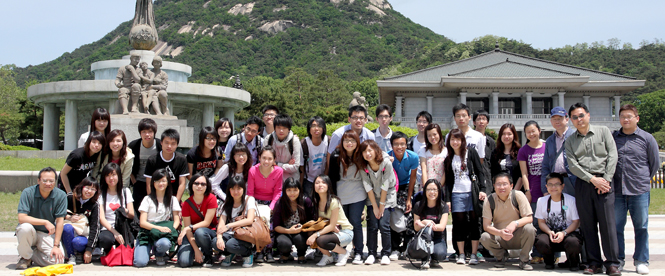
Analytical ability is another important element to evaluate in my assessment scheme. Besides the essay type assignment, some novel assessment activities are also used to further provide students with opportunities to demonstrate their creativity and application of the newly acquired knowledge. Thanks to my colleagues, Dr. CM Chow and Dr. HK Ngai, who have constructed a visual narrative website for the students, students from different UGEB courses offered by SLS can express their opinions and exchange their views on the specified issues related to human livings and life sciences. Furthermore, because Meme is one of the most prevalent internet-products on social media, I encourage students to create and submit a course-related Meme to get extra bonus credits. Gratefully, students have incredible responses to this learning activity. Some students are able to reflect on their deep-thinking and brilliant ideas in their Meme creation, and that really impressed me a lot. Some students would even express their views for the course through the Meme, showing that this funny assignment not only helps to evaluate students’ abilities but also provides a medium for the communication.
I believe that pedagogy should evolve over time. Advanced information technology provides us with a powerful means to develop a better teaching and learning environment which could be more appropriate for the new generation of students. I realize that numerous trials and compromises are required in the transformation process. I am very pleased to keep on learning and trying new approaches to help students achieve their learning goals.
高基存博士
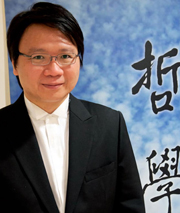
Dr. Kou, Kei Chun obtained his BA in Philosophy from the National Taiwan University. Later, he received his MPhil and PhD in Philosophy at The Chinese University of Hong Kong. He had been a research assistant before he served as a part-time lecturer at the Macao Polytechnic Institute. Dr. Kou joined the Department of Philosophy of CUHK in 2006. Apart from teaching courses on Logic and Analytical Philosophy for the Philosophy majors, Dr. Kou also offers GE courses every year, including UGED1815 Philosophy as a Way of Life, UGED1112 Logic and Argumentation, and UGED1111 Logic.
His research interests include pedagogy on critical thinking and logic, epistemology, philosophy of language, Anglo-American analytical philosophy, and ancient Greek and Roman philosophy. He is very fond of teaching. Both lecture preparation and delivery are for him one of the most enjoyable activities.
To prepare for a lecture is like the scripting of a play, and the delivery of a lecture is the enactment of the script. In my view, the performance of a teacher in the classroom is the sum total of his/her academic temperament. Therefore, teaching, in my view, is not just a profession, but also a way of life. So long as a teacher possesses the academic attributes and stamina to attract students’ attention, the lecture will be absorbing. These are the factors which motivate me to spend long hours preparing for lectures, knowing its ensuing benefits on students.
I have a fully-fledged teaching method. I am rather particular about my teaching materials; every theory, every example, and every humour is carefully thought out. I’m rather adept in capturing students’ attention and stimulating their learning interest.
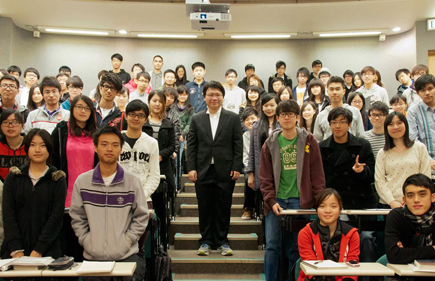
My Teaching Philosophy
Active Thinking: The purpose of teaching is to coach students in active thinking. John Dewey, the father of modern critical thinking as the core of general education, asserted that critical thinking is a kind of active thinking which is the antithesis to passive thinking. General education students who learn in the passive thinking mode know only to accept whatever information delivered by their teachers without going through the process of analysis. Students who think actively will consider problems carefully on their own. In order to achieve the goal of nurturing active thinking in general education, I always begin my lectures with discussions of problems, which is also a form of inspirational learning.
Dialectic: Dialectic is a philosophical methodology in finding the truth. The word “dialectic” means dialogue. But this is a special kind of dialogue which involves arguments and counterarguments. This process of dialectic is not so much to disprove the points of the opponents as to compel them to clarify and rectify their standpoints. In the end, both sides should have earned a deeper insight on the problems in question. My teaching approach to general education courses is one of dialectic in that I encourage students to express their views and build evidence around them, thereby making amendments on their understanding so that attainment of truth could be achieved through discussions.
Principle of Charity: Principle of Charity is a normative principle of communication. The principle strives to interpret at best the other person’s speech as truth. My teaching approach to general education courses follows this principle thoroughly in that I always interpret a student’s view as the most reasonable and the most effectual. As such, I encourage general education students to adopt this principle. Only in this context can students be motivated to express their views, hence trained to think independently so as to achieve the mutual benefits of learning and teaching.
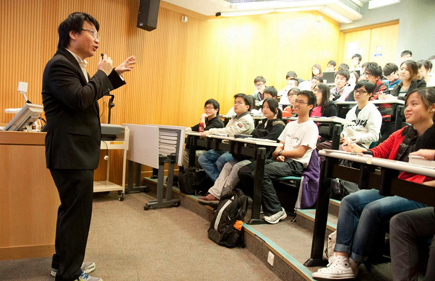
My Teaching Techniques and Method of Organizing and Selecting Teaching Materials
Cite concrete examples first, then explain abstract theories: Theories are extracted from the concrete instances of everyday life. To drive home to general education students the importance of scholarly theories and their correlations, a teacher must, before setting forth any theories, introduce relevant examples. Only then will general education students be motivated to learn about abstract theories.
Classroom atmosphere: The way I organise my lectures is like that of a movie storyboard with a continuous flow of atmosphere. I precede each topic with an interesting example to capture general education students’ attention. Every fifteen minutes or so, a stimulating yet interesting example will be put forth to illustrate the theory, resulting in an engrossing lecture.
Story: People are drawn to stories, whether they are history, biographies, or fairy tales. By expounding on a theory through the use of a story, students then need to engage both their right and left brains. This way, general education students will not feel tired so easily even though they are not majors in philosophy. Not only this–they will gain a deeper insight into the theory.
Interpretation skills: Good interpretation skills allow students to understand difficult academic concepts with ease. To use the simplest and most easily understood way to interpret academic concepts in general education, one must spend a good deal of time in preparation. Well thought out language, visual illustration, and clever analogies should be employed.
